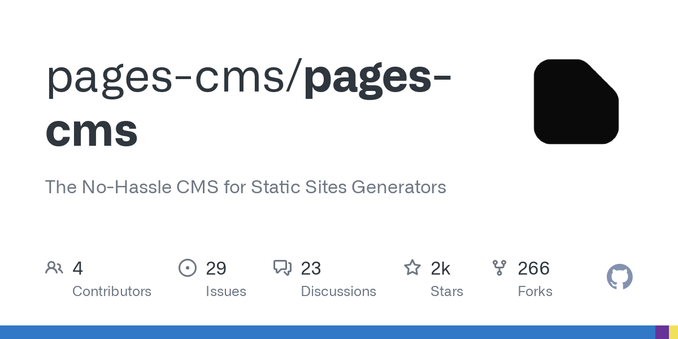Migrating from #VuePress to #VitePress: https://olets.dev/posts/migrate-from-vuepress-to-vitepress
I wrote a guide to migrating VuePress sites to VitePress
I was always a fan of #Vue, but never had the chance to try it. Now I explored building a sample webpage in #Vuepress 2.0 for a test phase workshop series:
https://ioer.gp.hrz.tu-chemnitz.de/fdz/campus/
See the description for how the page is setup and integrated with #Gitlab Continuous Integration (#CI):
https://ad.vgiscience.org/links/posts/2024-03-15-ioer@campus-vuepress/
Generally, I found #Vuepress easy to setup. But the `config.js` gets confusing quickly when adding multiple languages for accessibility (#I18n) and configuration settings.
by Ronan Berder
@hunvreus
The No-Hassle CMS for GitHub
#cms #Github #jekyll #staticsitegenerator #cms #vuejs #vue #hugo #nextjs #gatsby #staticsite #astro #ssg #docusaurus #eleventy #vuepress #vuejs3 #11ty #vitepress
https://github.com/pages-cms/pages-cms
https://pagescms.org/
Just finished migrating Forme's docs from #VuePress to #VitePress - pretty straight forward, a little bit of config foo but mostly it just worked!
実はMisskey HubがVuePressを使っているとこの記事で知って、興味を持ちました。 #vuepress
RE: https://calc.bal.ovh/notes/9ev46zmb56
Une alternative à #Docusaurus (#Reactjs) et #VuePress (#Vuejs) pour créer des documentations 💡
Fonctionnalités : #authentification, #recherche, #analyse, #sauvegarde
Réalisé avec #NodeJS #PostgreSQL #VueJS #elasticsearch #S3
Now that I am properly exploring #Vuepress, I think I will begin to transition my websites conlang.phundrak.com and config.phundrak.com to this framework in the upcoming months.
Currently, I directly export my #orgmode files to HTML files, but in the case of using Vuepress, I’d first export them to Markdown.
I also really like the possibility of using #Vuejs components directly in my Markdown files, which should help to make things look nicer.




